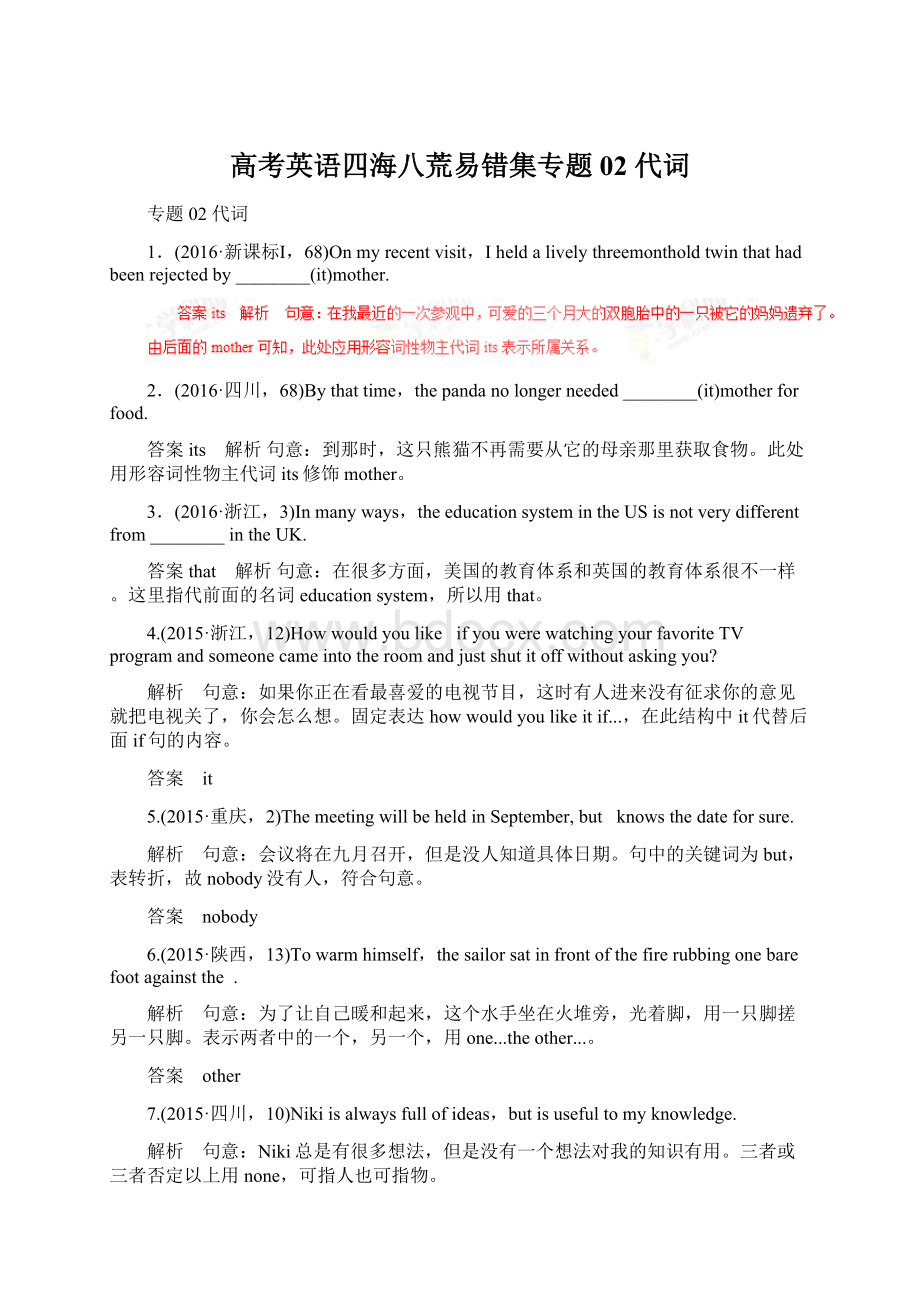高考英语四海八荒易错集专题02 代词.docx
《高考英语四海八荒易错集专题02 代词.docx》由会员分享,可在线阅读,更多相关《高考英语四海八荒易错集专题02 代词.docx(11页珍藏版)》请在冰豆网上搜索。

高考英语四海八荒易错集专题02代词
专题02代词
1.(2016·新课标Ⅰ,68)Onmyrecentvisit,Iheldalivelythreemontholdtwinthathadbeenrejectedby________(it)mother.
2.(2016·四川,68)Bythattime,thepandanolongerneeded________(it)motherforfood.
答案its 解析句意:
到那时,这只熊猫不再需要从它的母亲那里获取食物。
此处用形容词性物主代词its修饰mother。
3.(2016·浙江,3)Inmanyways,theeducationsystemintheUSisnotverydifferentfrom________intheUK.
答案that 解析句意:
在很多方面,美国的教育体系和英国的教育体系很不一样。
这里指代前面的名词educationsystem,所以用that。
4.(2015·浙江,12)HowwouldyoulikeifyouwerewatchingyourfavoriteTVprogramandsomeonecameintotheroomandjustshutitoffwithoutaskingyou?
解析 句意:
如果你正在看最喜爱的电视节目,这时有人进来没有征求你的意见就把电视关了,你会怎么想。
固定表达howwouldyoulikeitif...,在此结构中it代替后面if句的内容。
答案 it
5.(2015·重庆,2)ThemeetingwillbeheldinSeptember,butknowsthedateforsure.
解析 句意:
会议将在九月召开,但是没人知道具体日期。
句中的关键词为but,表转折,故nobody没有人,符合句意。
答案 nobody
6.(2015·陕西,13)Towarmhimself,thesailorsatinfrontofthefirerubbingonebarefootagainstthe.
解析 句意:
为了让自己暖和起来,这个水手坐在火堆旁,光着脚,用一只脚搓另一只脚。
表示两者中的一个,另一个,用one...theother...。
答案 other
7.(2015·四川,10)Nikiisalwaysfullofideas,butisusefultomyknowledge.
解析 句意:
Niki总是有很多想法,但是没有一个想法对我的知识有用。
三者或三者否定以上用none,可指人也可指物。
答案 none
8.(2015·天津,2)Thequalityofeducationinthissmallschoolisbetterthaninsomelargerschools.
解析 句意:
这所规模较小的学校的教育质量比一些规模较大的学校的教育质量好得多。
表示比较时,指代前面的qualityofeducation要用that,为了避免重复,可以代替前面提到的不可数名词。
答案 that
9.(2015·福建,21)Theresearchgroupproducedtworeportsbasedonthesurvey,butcontainedanyusefulsuggestions.
解析 句意:
这个研究组发布了以调查为基础的两个报道,但是都没有有用的建议。
考查代词。
根据句意
,两者都不用neither。
答案 neither
易错起源1、物主代词和反身代词的用法
例1.Tomfeltthathekneweverybody’sbusinessthantheyknewit__.
A.themselvesB.oneself
C.itselfD.himselfIs’sniceifa
【错误解答】D
【正确解答】A
【锦囊妙计,战胜自我】
1.英汉差异。
英语中必须有形容词性物主代词,而汉语中往往省略不翻译。
例如:
Jacktookoffhiscoatandwentgobed(his不能省略)
2.“of+名词性物主代词”用作定语。
例如:
Somefriendsofminewillattendmybirthdayparty.
That car ofhersisa1waysbreaingdown.
3.“形容词性物主代词+own+名词”表示强调,在own前还可加very表示进一步的强调。
例如:
It’sniceifamancanhavehisowncar.
Iwantto
havemyveryowncar.
4.“a(an,Some,any)+名词+ofone’sown”表示“某人自己的……”的意思。
名词前可以用this,that,these,four,those,several,another,no,whieh等修饰,但不能用定冠词the。
例如:
5.反身代词的习惯用语。
byoneslf=alone独自地,亲自
tooneself暗自
foroneself为自己
inoneself本质上
ofonesflf自动地,自发地
beoneself玩得愉快
dressoneslfin穿着……
helponeslfto随便吃……,自行取用
cometooneself苏醒
makeoneselfathome不要客气
devoteomeselfto专心于;献身于……
findomeselfin/at发觉自己来到……
teachoneself自学
dressoneself自己穿
loseoneself迷路
excuseoneself自我辩解
易错起源2、不定代词的用法
例2.—Oneweek’stimehasbeenwastea.
—Ican’tbelievewedidallthatworkfor__.
A.somethingB.nothing
C.everythingD.anything
【错误解答】A或D
【错解分析】前者说:
一周的时间已被浪费掉了。
后者说:
我无法相信我们所做的一切毫无结果/什么都没换来。
句中的for有“替挟、兑挟”之意。
一周内干了许多工作,却劳而无功,所以才白白浪费了一周时间,没有换来任何成果。
【正确解答】B
【名师点睛】
易混不定代词的用法区别:
1.some和any
二者都可用作名词(作主语或宾语),也可用作形容词(作定语)来修饰可数名词或不可数名词。
(1)some一般用于肯定句中。
当some用于单数可数名词前时,表示”某一(个)”,与数字连用则表示“大概,大约”的意思,用于疑问句时,表示说话人希望得到肯定的回答,或表示请求,建议。
例如:
I’vereadthestoryinsomebook.(某一本)
Somegirl.iswaitingforyouattheschoolgate.(某个)
Thecountryhasexportedsometwomillionbikesthisyear.(大约)
MayIhavesomewater?
(表示请求)
Wouldyoulikesomeapples?
(邀请)
(2)any多用于疑问句,否定句和条件句中。
在肯定句中,any表示“任何的”,修饰单数可数名词。
也可用作状语,表示程度。
例如:
both两者都,all三者或三者以上,全体;在句中可作主语、宾语、定语和同位语。
(1)all除了指人,作主语时,谓语动词用复数;还可指物,表示“所有,一切”,作主语时,谓语动词用单数,也可用来修饰不可数名词。
例如:
Allbutonearepresent.(作主语,指人,谓语动词用复数)
Allisoverwithhim.(作主语,指物,谓语动词用单数)
Ihaveforgottenallaboutit(作宾语)
Allhopehasgone.(修饰不可数名词)
Theyallagreetostayhere.(作同位语)
3.much和many
两个词都有“许多”的意思,much表示或修饰不可数名词,many表示或修饰可数名词。
在口语中,much或many多用于疑问句或否定句,在肯定句中常用alotof,lotsOf,plentyof,alargequantityof,quantitiesof代替。
much还可以用agreatdealof代替,many可以用a(1arge)numberof代替。
(1)much可用作副词,作状语,表程度。
benotmuch意为“不怎么样”,much还可与too连用,构成“toomuch+不可数名词”短语,意为“太多的……”或“muchtoo+形容词或副词”短语,意为“太……“非常”,是副词词组,修饰形、副词,但不修饰动词。
例如:
Thecityismuchlargerthanthatone.
I’vevisitedthecountryanditisnotmuch.
ThereistoomuchnoiseintheclassroomI’mmuchtoobusytoseevisitors.
(2)manya+可数名词单数,表示“许多”。
在名词前如果有冠词或指示代词等词时,要用many
of或muchof结构,例如:
Manyastudenthasgonetothecinema.
Manyofthe/mybooksareEnglish.
(1)each强调个体,在句子中充当定语,主语,宾语和同位语,指两者或两者以上的人或事物中的每一个。
例如:
Eachroomcanseatatleastfiftypeople.
Eachofthestudentswillgetanewbook.
Eachstudentwillgetanewbook
Thestudentseachwillgetanewbook.
Therearetreesandflowersoneachsideofthestreet.(街道只有两边,不能用every)
(2)every强调整体,在句中只能作定语,指三者或三者以上的人或事物中的每一个。
还可以表示“每隔……”构成“every+数词+复数名词”,“every+few+复数名词”,“every+other+单数名词”,“every+序数词+单数名词”,例如:
Everyonehasstrongandweakpoints.
Everystudenthastoldastory.
everythreeweeks每隔三个星期,每隔两个星期
everyotherweek=everysecondweek每隔一星期
everyfewweeks(不能说evesryafewweeks)每隔几个星期
6.either和neither
either指“两个人或物中的任何一个”,表示肯定意义,neither指“两个人或物一个也不”,表示否定意义。
这两个词作主语时,谓语动词要用单数。
①either可放在否定句的句尾,表示”也”。
例如:
Idon’tknoweither.我也不知道。
②either可用作连词,“或者,要么”的意思,一般与。
or连用,构成“either
...or”短语,意为“不是……就是……”,“或者……或者……”。
当这一短语连接两个名词或代词作主语时,谓语动词在人称和数上要同最近的主语保持一致,如:
EitherheorIamtoblame.
Iseitherheoryougoingtothecinema?
Areeitheryouorhegoingtothecinema?
③either修饰名词时,前面不用物主代词,指示代词或定冠词,可以说:
“eitherpen”,但不能说“theeitherpen或eithermypen”
④either用作代词时,可以单独使用,也可和of连用,of后接复数名词,名词前要用一个物主代词,指示代词或定冠词,如:
Hedoesn’tlikeeitherofthetwoplaces.
⑤当eitherof作主语时,动词一般用单数形式,但在否定句和疑问句中,动词也常用复数,特别在口语中,如:
7.no和none
Eitherofthemisgoodenough.Idon’tthinkeitherofthemareathome.
(1)no表示“不”“无”只能作定语,修饰不可数名词或可数名词单复数,相当于notany或nota。
例如:
Thereisnowaterinthebottle.
(2)none表示“没有人,任何人也不”用作名词,相当于noone或notany,常同of连用,构成“Noneof...”结构,none作可数名词用时,指三者或三者以上,作主语时谓语动词用单数或复数均可,none作不可数名词时,谓语动词用单数,none在句中作主语或宾语,不作定语,不与名词连用,例如:
Noneofbooksare(is)interesting.
注意:
①nonebut+复数名词作主语时,谓语动词要用复数,例如:
Nonebutwolveswalklikethat.除非狼才会那么走。
②none和noone的区别:
none回答以howmany/much引导的特殊疑问句或“anyof+限定词+名词”或表一定范围的一般疑问句,noone回答以who引导的特殊疑问句及含有anybody或无限定范围的一般问句,简言之,none表示数量,noone表示没有人,例如:
—Howmanystudentsare
thereintheclassroomnow?
—None.
—HowanyofyoueverbeentotheGreatWall?
—None.
—Whocananswerthequestion?
—Noone.
8.other,another,others,anyother,theother的用法。
(1)other表示泛指,意为“另外的,其他的”。
常与复数名词或不可数名词连用。
如果其前有the,this,some,any,each,every,no以及形容词性物主代词时,其后就可接单数名词。
例如:
Ihavenootherplacetogo.
(2)another常用于指三者或三者以上中的“另外一个”,泛指单数。
可以单独使用,也可以接名词。
如果其后接复数名词,则表示“又,再,还”。
例如
:
Thiscapistoosmallforme.Showmeanother(one).
Weneedanotherthreeassi
stantsinourcompany.
(3)others是other的复数形式,表示泛指,意为“别的人或物”,但不指全部。
特指时在其前加定冠词;前面可加任何限定词以及数量词。
例如:
Hehasmoreconcernforothersthanforhimself.
(4)anyother表示一个之外的其他任何一个,百不是两个之中的另一个。
例如:
ChinaislargerthananyothercountryinAsia.
(5)theother,表示两者中的另外一个。
可以单独使用,以可接单数名词。
例如:
Noagreementwasreachedinthediscussionasneithersidewouldgiveawaytotheother.
易错起源3、代词出at、it、one的用法
例
3.Carsdocauseassomehealthproblems__infactformoreseriousthanmobilephonesdo.
A.oneB.onesC.itD.those
【错误解答】D
【正确解答】B
【名师点睛】
代词it的主要用法
用作人称代词,指代前文提到过的事物。
例如:
Thisisnotmybook.ItisMary’s.
用来代替指示代词出,this或that。
例如:
—What’sthis?
—It’sadictionary.
—Whosejacketisthat?
—Itishers.
在性别不清楚时用来指人。
例如:
—Who’sknockingatthedoor?
—It’sme.
(
4):
指时间;距离、天气、环境等。
例如:
—What’sthetimenow?
—It’stenpasttwenty.
It’sgettingwarmerandwanner.
It’sabouttenmiles’ridefrommyhometothetown.
(5)指代整个句子的内容;例如:
Ourteamwonthefootballmatch.Haveyouheardaboutit?
(6)用于某些习惯用语中作宾语,对这些习惯用语只能从整体上来理解;例如:
Ihateitwhenpeoplespeakwiththeirmouthsfull.
We’llfootit.
Asitis,wecanhardlygettothestationby7o’clock.
【锦囊妙计,战胜自我】
代词it,they与替代词one,ones,theone,theones,that,those的用法区别:
(1)it指代前面提到过的事物,they是它的复数形式。
(2)one替代单数名词,表示不特定的名词,也就是指泛指,ones是它的复数形式。
(3)theone替代前面的单数名词,表示特指,往往其后带动定语,theones是它的复数形式。
(4)that既可替代单数可数名词,也可以替代不可数名词,若替代单数名词时,相当于theone.
(5)those替代复数名词,相当于theones.例如 :
Yourstoryisinteresting,butIdon’tIikeit.(句1)
Thisstoryisaninterestingone.(句2)
Ihaven’tacomputer.Iwanttobuyonenextyear.(句2)
Thedictionaryonthedeskismuchbetterthanthat(theone)ontheshelf.(句3)
ThepopulationinChinaismuchlargerthanthatinAmerica.(句4)
Theconditionsarelikethoseintherealspaceship.(句5)
TheweatherinBeijingismuchcolderthanthatinHuangganginwinter.(句4)
Studentsinourclassaremorehard–workingthanthoseinMr.smith’sclass.(句5)
Thereisonlyonecomputerofthetypeintheshop,soIwanttobuyitformydaughter.(句1)
1.Oneday,hecameupwithanideahewouldpluckupallofhiscropafewinches.
解析 考查同位语从句的引导词。
因后面是一个完整的句子,且该句是说明空格前面anidea的具体内容,所以是同位语从句。
从句结构完整,故要用that引导。
答案 that
2.isimportantisthatweletothersknowwecareaboutthem.
解析 考查主语从句的引导词。
根据句子结构可知,系动词is前的句子缺少主语,表示“重要的事情”要用what。
答案 What
3.Overthenextseveralmonths,myprofessortaughtme
onestorywassomuchbetterthantheother.
答案 why
4.Astudyfoundgirlswhoatefiveormorefamilymealsaweekhadamuchhealthierrelationshipwithfoodinlaterlife.
解析 考查宾语从句的引导词。
谓语动词found后为宾语从句,宾语从句中不缺少成分,故要用that引导。
答案 that
5.Perhapsmymotherhadtoldmewasdeeplyrootedinmymind.
解析 考查主语从句的引导词。
妈妈说的话深深地扎根于我的思想中。
系动词was前为主语从句,从句中缺少宾语,故要用what引导。
答案 what
6.Evenmoreupsettingwasthefactthedriverdidn'tstopafterward.
解析 考查同位语从句。
thefact后面是同位语从句,要用that来引导。
答案 that
7.But,fromI'veheard,perhapsheworkedtoohard.
解析 考查宾语从句。
从我听说的来看,也许他更努力些。
介词from后是what引导的宾语从句,what作动词hear的宾语。
答案 what
8.Well,thereisarumorgoingaroundtheheadoftheDepartmentisleaving.
解析 考查同位语从句。
有一个谣言说,部门的领导马上就要走了。
that引导的是名词rumor的同位语从句。
答案 that
9.Theeasiestwaytodothisistomakeasimplelistofit